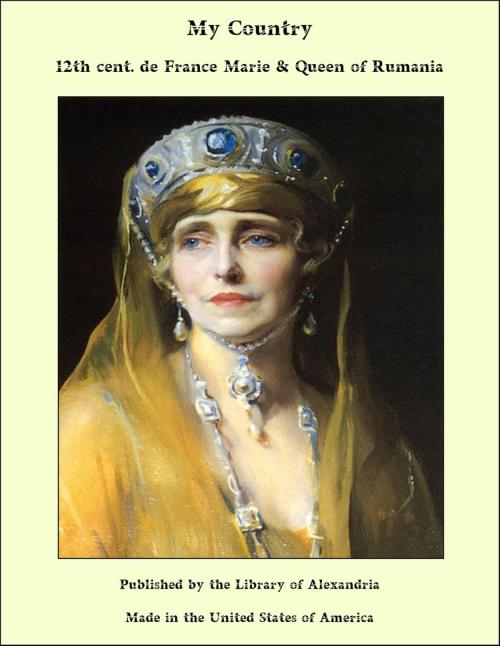| Author: | 12th cent. de France Marie & Queen of Rumania | ISBN: | 9781465605788 |
| Publisher: | Library of Alexandria | Publication: | March 8, 2015 |
| Imprint: | Language: | English |
| Author: | 12th cent. de France Marie & Queen of Rumania |
| ISBN: | 9781465605788 |
| Publisher: | Library of Alexandria |
| Publication: | March 8, 2015 |
| Imprint: | |
| Language: | English |
It were impossible to describe all I have seen, heard, or felt whilst moving amongst these simple, warm-hearted people; so many vivid pictures, so many touching scenes have remained imprinted on my heart. I have wandered through villages lost in forsaken spots, upon burning plains; I have climbed up to humble little houses clustering together on mountain-sides. I have come upon lovely little places hidden amongst giant pines. On forlorn seashores I have discovered humble hamlets where Turks dwelt in solitary aloofness; near the broad Danube I have strayed amongst tiny boroughs inhabited by Russian fisher-folk, whose type is so different from that of the Rumanian peasant. At first sight one recognises their nationality—tall, fair-bearded giants, with blue eyes, their red shirts visible from a great way off. It is especially in the Dobrudja that these different nationalities jostle together: besides Rumanians, Bulgarians, Turks, Tartars, Russians, in places even Germans, live peacefully side by side. I have been to a village in the Dobrudja which was part Rumanian, part Russian, part German, part Turkish. I went from one side to another, visiting many a cottage, entering each church, ending my round in the tiny rustic mosque hung with faded carpets, and there amongst a crowd of lowly Turks I listened to their curious service, of which I understood naught. A woman who is not veiled has no right to enter the holy precinct; but a royal name opens many a door, and many a severe rule is broken in the joy of receiving so unusual a guest. On a burning summer's day I came to a tiny town almost entirely inhabited by Turks. I was distributing money amongst the poor and forsaken, and had been moving from place to place. Now it was the turn of the Mussulman population, therefore did I visit the most wretched quarters, my hands filled with many a coin. Such was their joy at my coming that the real object of my visit was almost forgotten. I found myself surrounded by a swarm of excited women in strange attire, prattling a language I could not understand. They called me Sultana, and each one wanted to touch me; they fingered my clothes, patted me on the back, one old hag even chucked me under the chin. They drew me with them from hut to hut, from court to court. I found myself separated from my companions, wandering in a world I had never known. Amongst a labyrinth of tiny mud-built huts, of ridiculously small gardens, of hidden little courts, did they drag me with them, making me enter their hovels, put my hand on their children, sit down on their stools. Like a swarm of crows they jabbered and fought over me, asking me questions, overwhelming me with kind wishes, to all of which I could answer but with a shrug of the shoulders and with smiles. The poorer Mussulman women are not really veiled. They wear wide cotton trousers, and over these a sort of mantle which they hold together under the nose. The shape of these mantles gives them that indescribable line, so agreeable to the eye, and which alone belongs to the East. Also the colours they choose are always harmonious; besides, they are toned down to their surroundings by sun and dust. They wear strange dull blues and mauves—even their blacks are not really black, but have taken rusty tints that mingle pleasingly with the mud-coloured environment in which they dwell.
It were impossible to describe all I have seen, heard, or felt whilst moving amongst these simple, warm-hearted people; so many vivid pictures, so many touching scenes have remained imprinted on my heart. I have wandered through villages lost in forsaken spots, upon burning plains; I have climbed up to humble little houses clustering together on mountain-sides. I have come upon lovely little places hidden amongst giant pines. On forlorn seashores I have discovered humble hamlets where Turks dwelt in solitary aloofness; near the broad Danube I have strayed amongst tiny boroughs inhabited by Russian fisher-folk, whose type is so different from that of the Rumanian peasant. At first sight one recognises their nationality—tall, fair-bearded giants, with blue eyes, their red shirts visible from a great way off. It is especially in the Dobrudja that these different nationalities jostle together: besides Rumanians, Bulgarians, Turks, Tartars, Russians, in places even Germans, live peacefully side by side. I have been to a village in the Dobrudja which was part Rumanian, part Russian, part German, part Turkish. I went from one side to another, visiting many a cottage, entering each church, ending my round in the tiny rustic mosque hung with faded carpets, and there amongst a crowd of lowly Turks I listened to their curious service, of which I understood naught. A woman who is not veiled has no right to enter the holy precinct; but a royal name opens many a door, and many a severe rule is broken in the joy of receiving so unusual a guest. On a burning summer's day I came to a tiny town almost entirely inhabited by Turks. I was distributing money amongst the poor and forsaken, and had been moving from place to place. Now it was the turn of the Mussulman population, therefore did I visit the most wretched quarters, my hands filled with many a coin. Such was their joy at my coming that the real object of my visit was almost forgotten. I found myself surrounded by a swarm of excited women in strange attire, prattling a language I could not understand. They called me Sultana, and each one wanted to touch me; they fingered my clothes, patted me on the back, one old hag even chucked me under the chin. They drew me with them from hut to hut, from court to court. I found myself separated from my companions, wandering in a world I had never known. Amongst a labyrinth of tiny mud-built huts, of ridiculously small gardens, of hidden little courts, did they drag me with them, making me enter their hovels, put my hand on their children, sit down on their stools. Like a swarm of crows they jabbered and fought over me, asking me questions, overwhelming me with kind wishes, to all of which I could answer but with a shrug of the shoulders and with smiles. The poorer Mussulman women are not really veiled. They wear wide cotton trousers, and over these a sort of mantle which they hold together under the nose. The shape of these mantles gives them that indescribable line, so agreeable to the eye, and which alone belongs to the East. Also the colours they choose are always harmonious; besides, they are toned down to their surroundings by sun and dust. They wear strange dull blues and mauves—even their blacks are not really black, but have taken rusty tints that mingle pleasingly with the mud-coloured environment in which they dwell.















